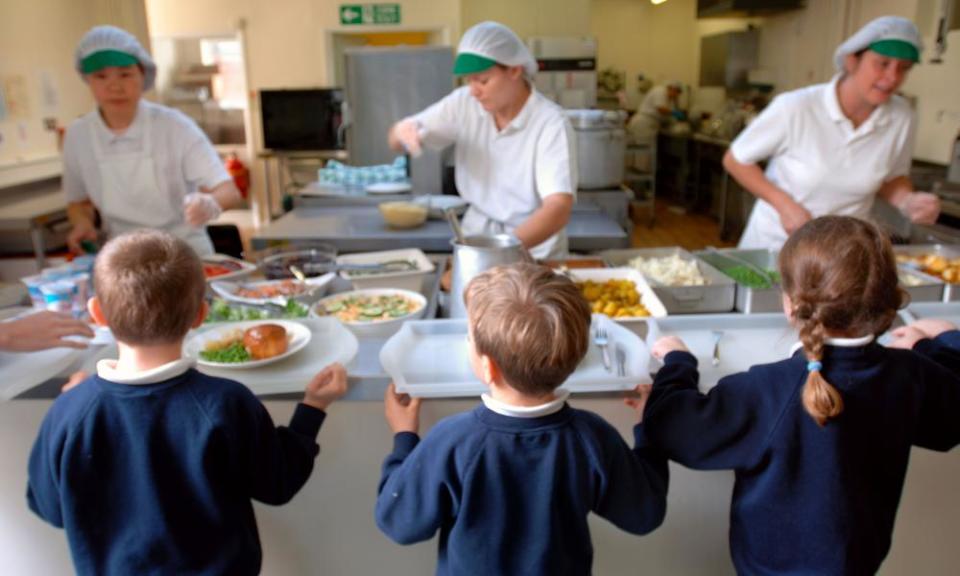What sort of country would tolerate child poverty rising to 40%? Maybe the UK

Of all the destructions of the dismal decade, history will surely judge the deliberate downgrading of children the most perverse. “Our children are our future” used to be a tired old bromide trotted out by every politician, but if you look at spending, you would say the old have been the future for the Conservatives.
Related: Fears child poverty may rise to record 60-year high under Tories
What does it say about Britain that the old took priority with triple-locked pensions, while everything for the young was cut to shreds – education, benefits, youth services, sure starts, arts, sports – everything? The “future” for the Tories only stretched as far as cajoling oldies into the polling booths at the next election. Since 2010, spending on children has fallen by 10%, making children the most likely to be poor – and the old the least: contrary to what Boris Johnson told Andrew Marr last weekend, child poverty is rising sharply on current government plans, to nearly 40% by 2022.
Angela Rayner, spelling out again Labour’s priorities for children, reminded us she would be an education minister like no other, her emphasis exactly where it’s most needed, on the long tail of failure that drags down national results, the half not destined for university. Her own back story of single motherhood at 16, saved by a further education college, and Sure Start for her child, is the guarantee that for the first time in years someone who really understands what’s needed will pay more than lip service to toddlers, skills and life chances.
All children will gain from Labour’s big uplift in school spending and extra teachers, but the chances are that Rayner would most improve results by focusing on the non-university half. Before anyone says magic-money-tree unaffordable, remember the Resolution Foundation judges Labour’s plans would increase the size of the state to the average for similar north European countries.
What a polar opposite Rayner would be to all that Michael Gove did, with his endless favouring of top achievers. He toughened GCSEs so top universities could distinguish better between A* candidates. His more finely graded system has, says the Sutton Trust, widened the gap as fewer disadvantaged children now get the top grade 9, compared to those who used to get A*. Grammar schools have expanded, and his free schools were designed for sharp-elbowed parents and religious schools were allowed to select 100% of their pupils. I have seen even low-paid families struggle to pay for extra tuition to help keep their children up with the more affluent.
This week’s Pisa results show a moderate improvement in maths and English scores – good – though worth noting these children spent their primary years better funded under Labour, where David Blunkett’s introduction of the literacy and numeracy hour created an uplift in scores.
When it comes to GCSE results, the rising number of pupils “off-rolled” before they get to them – the 24,600 conveniently disappeared – boost many schools’ results. Unsurprisingly, it has been impossible to recruit enough teachers; training targets have been missed for the last seven years. The relentless orders, tick-boxes and inspections, with an overly rigid curriculum, has turned them into stressed-out automatums.

Look at the price children paid for Gove’s Gradgrind regime. Pisa found exceptional joylessness in British children, the UK alone in having almost half our children regularly feeling sad and not able to say, “my life has a clear meaning and purpose.” Children’s mental health has worsened severely, with one in eight needing help.
Look at all that’s been lost of those things that might make children happy: the selling off of playgrounds and sports grounds, with closed or price-hiked leisure centres and virtually no youth services. The children’s commissioner finds: “We have the least physically active generation of children ever.” Look how the arts are vanishing from many schools. Music entries for GCSE have dropped by over a fifth, and only half of children take any arts subject as drama, dance, art and music. What of enriching lives? Or, in Gradgrind mode, learning the disciplines imposed by performance?
Rayner’s free breakfasts will do much more than measurably increase the technical attainment of the poorest. They are a welcome into school as a kindly nurturing place each morning for every child, as is keeping schools open for after-school and holiday play. The Child Poverty Action Group and Thomas Coram Research Unit’s research into child hunger is shocking, as children tell of stabbing hunger pains, and meal-skipping parents pretending they have eaten. Children speak of sitting with friends at lunchtime pretending they don’t want to eat. Only 15% qualify for free school meals, and many more go hungry after the Tories lowered the income threshold families need to fall below in order to qualify for them. Labour’s policy of free meals for all primary school children will reach the many children of gamblers, addicts or parents suffering from mental health issues, who fall below the radar.
The greatest loss has been the closure or virtual destruction of Labour’s best achievement, the 3,500 Sure Start children’s centres that Rayner will bring back. The best hope of happiness is helping families resolve problems from birth.
Related: Labour pledge: we would give six years of free study for adults
It’s no surprise that in all the harshness and mean-spiritedness of this decade’s policies, people feel compassion has been lost. Today, a survey from Action for Happiness finds 60% of people believe Britain has become less caring over the last 10 years. As you prepare to vote, note its findings on the top five predictors for how compassionate people are, irrespective of income, social class or location. These are the factors they found were most associated with compassion: being female, voting remain, living with others, being under 35 – and voting Labour.
• Polly Toynbee is a Guardian columnist

 Yahoo News
Yahoo News 
